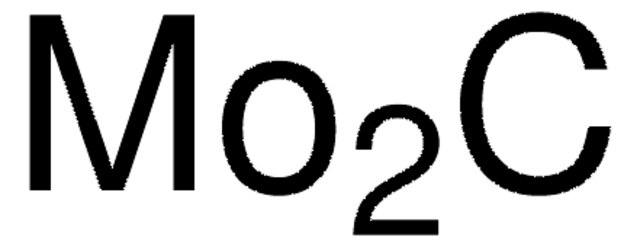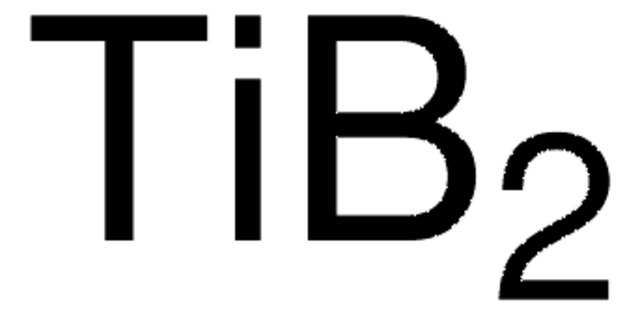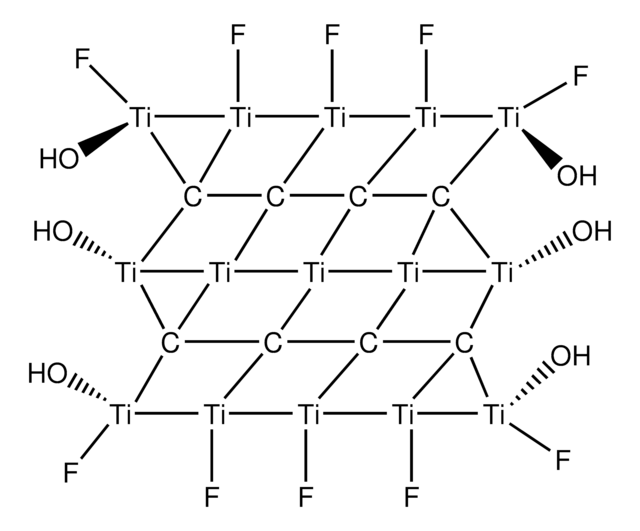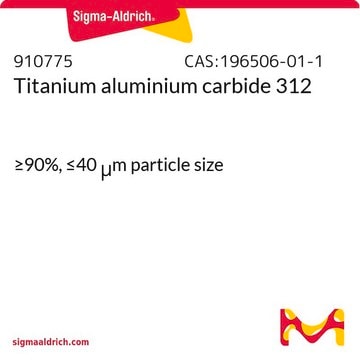About This Item
Wzór liniowy:
TiC
Numer CAS:
Masa cząsteczkowa:
59.88
Numer WE:
Numer MDL:
Kod UNSPSC:
12352300
Identyfikator substancji w PubChem:
NACRES:
NA.23
Polecane produkty
Próba
98%
Postać
powder
wielkość cząstki
−325 mesh
tw
4820 °C (lit.)
mp
3140 °C (lit.)
gęstość
4.930 g/mL at 25 °C (lit.)
ciąg SMILES
[C-]#[Ti+]
InChI
1S/C.Ti/q-1;+1
Klucz InChI
YXIVWSJCLXKLJL-UHFFFAOYSA-N
Szukasz podobnych produktów? Odwiedź Przewodnik dotyczący porównywania produktów
Powiązane kategorie
Kod klasy składowania
11 - Combustible Solids
Klasa zagrożenia wodnego (WGK)
WGK 1
Środki ochrony indywidualnej
Eyeshields, Gloves, type N95 (US)
Certyfikaty analizy (CoA)
Poszukaj Certyfikaty analizy (CoA), wpisując numer partii/serii produktów. Numery serii i partii można znaleźć na etykiecie produktu po słowach „seria” lub „partia”.
Masz już ten produkt?
Dokumenty związane z niedawno zakupionymi produktami zostały zamieszczone w Bibliotece dokumentów.
Klienci oglądali również te produkty
Yuhe Zhu et al.
Dental materials journal, 26(2), 245-253 (2007-07-12)
Carbide layer was formed on the surface of Ti by heating in hydrocarbon atmosphere (benzene C6H6) at 1000-1400 degrees C using a high frequency induction heating method. Physical and mechanical properties of carbide-coated Ti were investigated to examine its potential
Lingzhou Zhao et al.
Biomaterials, 31(32), 8341-8349 (2010-07-30)
Cell-repelling structures are often required in biosensors, bioelectronics, and drug delivery systems, but the search for satisfactory cell-repelling structures with good biocompatibility and long-term stability is challenging. In this work, two types of quasi-aligned nanowire arrays (QANWA) with different surface
T Henning et al.
Spectrochimica acta. Part A, Molecular and biomolecular spectroscopy, 57(4), 815-824 (2001-05-10)
We review the evidence for carbides in space both from infrared spectroscopy and direct measurements on presolar grains extracted from primitive meteorites. The paper includes a discussion of the structural properties of silicon carbide and metal carbides and their formation
Jorge L Chávez et al.
Nanotechnology, 21(5), 055703-055703 (2009-12-22)
Hybrid organic-inorganic templates and core-shell nanoparticles were used as models to study the communication between fluorescent probes placed inside nanoparticles. The hybrid templates were prepared on the basis of a mixed-surfactant system using octadecyltrimethoxysilane as a reactive amphiphile. The core-shell
J Rohrer et al.
Journal of physics. Condensed matter : an Institute of Physics journal, 22(1), 015004-015004 (2010-01-13)
We present a strategy to identify energetically favourable oxide structures in thin-film geometries. Thin-film candidate configurations are constructed from a pool of sublattices of stable and metastable oxide bulk phases. Favourable stoichiometric compositions and atomic geometries are identified by comparing
Nasz zespół naukowców ma doświadczenie we wszystkich obszarach badań, w tym w naukach przyrodniczych, materiałoznawstwie, syntezie chemicznej, chromatografii, analityce i wielu innych dziedzinach.
Skontaktuj się z zespołem ds. pomocy technicznej









